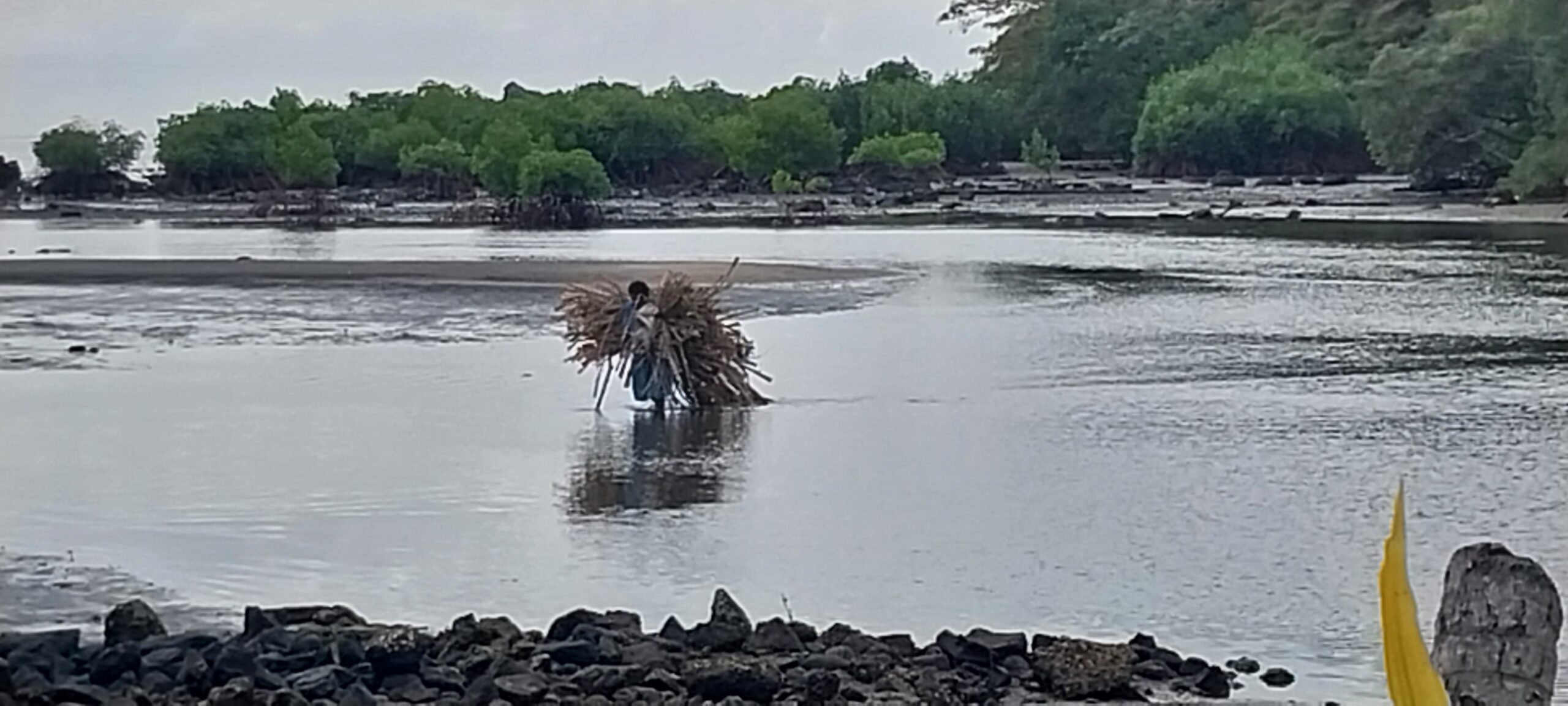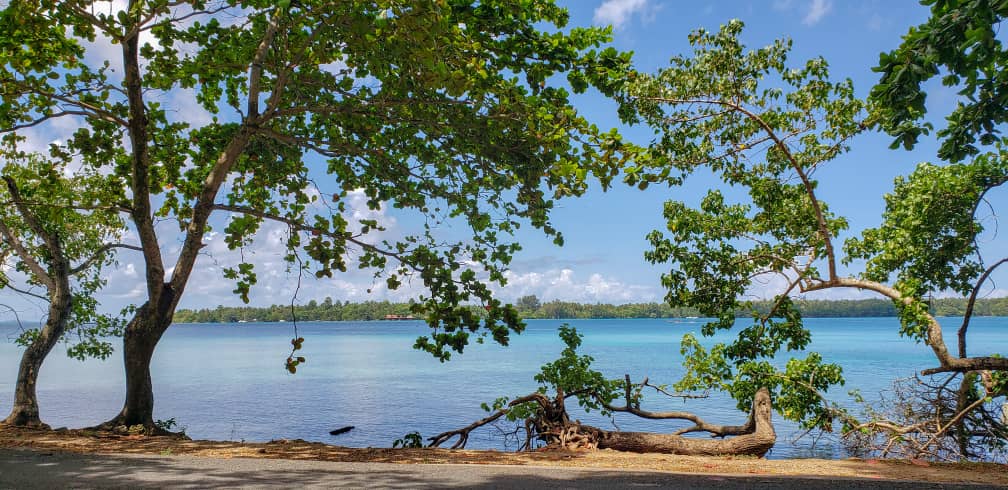Women in fisheries profile: Teri Tuxson LMMA Network Assistant Coordinator
“I’ve always loved the sciences, and originally wanted to pursue a career in coral reef ecology;
however, I also really wanted to help my Pacific peoples and this led me to where I am now,
working in community-based fisheries management” – Teri Tuxson.
Caroline Vieux, our Network Coordinator, recently sat down with Teri Tuxson to reflect on her passion for community-based fisheries management SPC’s Women in Fisheries Information Bulletin #36. This interview can be downloaded as a pdf here.
Teri Tuxson, Assistant Network Coordinator (LMMA)
When you remember the Fiji of your childhood, what strikes you as a major change?
When I was a kid, it seemed like people cared more for their surroundings and their environment, civic pride was higher than it is today. Especially here in Suva, pollution is out of control, and it starts with the little things, throwing something out the bus window, which will eventually end up in the ocean. Some days, it seems an uphill battle to try and make a change.
There were also a lot more environment and litter awareness campaigns than there are today – in the schools and in the media – enabling our youth to connect with their environment and take greater ownership over their surroundings, I feel like we’ve lost a lot of that. I think we each have a responsibility to our environment, to our families, and to one another, and that used to be inherent in our Pacific culture’ living in the city, it is more obvious that part of our traditional ways are dying.
Your mother is from Rotuma, what have been your links with this island, do you still go and how are fishing communities doing there?
Growing up, we went quite often at Christmas because we have a lot of family that still live on the island, and also before COVID-19 we would try to go once a year. When I returned from my undergrad studies, I was a volunteer with the LajeRotuma Initiative, a non-profit working with communities, traditional leaders, women’s groups, and school students on the island. The initiative currently serves as an entry point for foreign scientists wanting to conduct research on the island. In the beginning, the LajeRotuma Initiative had a marine focus and we did a lot of community engagement about maintaining the health of marine resources, and I was lucky enough to be part of the dive team that surveyed the island’s reefs to determine the health of the inshore marine environment. Rotuma is interesting in that it actually doesn’t need much in the way of marine conservation and management efforts. This is because fishing pressure is quite low there, the reefs are healthy, and there isn’t a lot of fiishing occurring that warrants full-on management initiatives.
Of course, there are always areas where things can be improved but the island communities aren’t suffering from a decrease in marine resources, like in many other places in Fiji.
I see you that you have spent six years working on super-yachts all over the world? What were your responsibilities and what made you eventually come back to Fiji?
I was employed as deck crew, which is mostly a male-dominated position, starting as deckhand, working my way up to bosun, then finally as mate, earning my licence to drive 200-tonne boats. Working on deck, you are responsible for navigational watches and helping the captain drive the ship, maintain the exterior of the vessel and all tenders, and as mate, you’re also responsible for crew management and logistics. It was a great experience, traveling to exotic places, meeting interesting people, but I really missed working in conservation, I missed the Pacific, and I wanted to be back helping my community, and while it was fun and enabled me to travel, I felt unfulfilled. I’m much happier now that I’m back in Fiji and working with Pacific communities.
What do you do for the LMMA Network International?
Currently, I am the Assistant Coordinator. Basically, we work across the region, empowering communities to manage their resources with minimal external help, and we also perform an advocacy role for raising diverse community voices at various levels, among other things.
My first task when I joined in early 2020 was to coordinate surveys around the Pacific to determine the impacts of the COVID-19 pandemic on island and coastal communities.
Now, my main focus is assisting with the Network’s 100% Solution through our project under the Pacific-European Union Marine Partnership project funded by the European Union and Sweden. The project’s focus is on scaling up community-based fisheries management in Melanesia; so, it is trialing a brand-new approach to empower a majority of the communities instead of the current model of supporting single communities or districts.
More than 80% of Pacific coastal communities don’t receive support with fisheries management so this new approach aims to empower women, men, and youth equally to take these first steps. I’m working a lot on the monitoring and evaluation part of the project but assisting in other ways too.
What do you like about working for the LMMA Network International?
The most exciting thing about working for the LMMA Network is promoting the 100% Solution and trialling this brand-new strategy that we are using in the PEUMP project. So many communities are left out because we haven’t figured out a successful model of how to scale up coastal fisheries management. Hopefully, the work we are doing here will prove that we can reach a majority of communities if we just change our approach and our way of thinking, and this approach includes women whom we don’t want to be left outside of the decision-making arena when they are playing such a key role in the fisheries sector. I also like the people.
I’m blessed to be able to learn from, and be supported by, so many experienced and clever people – our network advisors, our partners on the ground, and my mentor and our network coordinator, Caroline Vieux. I am grateful to be here.
What would you like to say to all women involved in fishing or fisheries management in the Pacific region?
Value your traditions and hold on to the ways taught to you by your elders. The world is changing quickly but retaining our traditions and values helps maintain our connection to the ocean and our surroundings. Also don’t be afraid or shy to speak up if you see changes in your marine environment or in the state of your resources. Men and women occupy different spaces in the sphere of fishing and these changes may not get noticed if women don’t make their voices heard.
More about Teri Tuxson:
Teri Tuxson is our Network Assistant Coordinator and is based in Suva. She was born and raised in Suva, and is the daughter of Viki Fakraufon from Rotuma, a remote Polynesian island in northern Fiji, and Bob Tuxson, who originally came to the Pacific as a biologist with the Smithsonian Museum and then later returned with the Peace Corps.
Much of her love for the ocean comes from her parents. She has studied biology, both in Fiji and the United States, and has recently completed a postgraduate diploma in climate change adaptation, and will be starting a Master’s program in community-based fisheries management at the University of the South Pacific.





